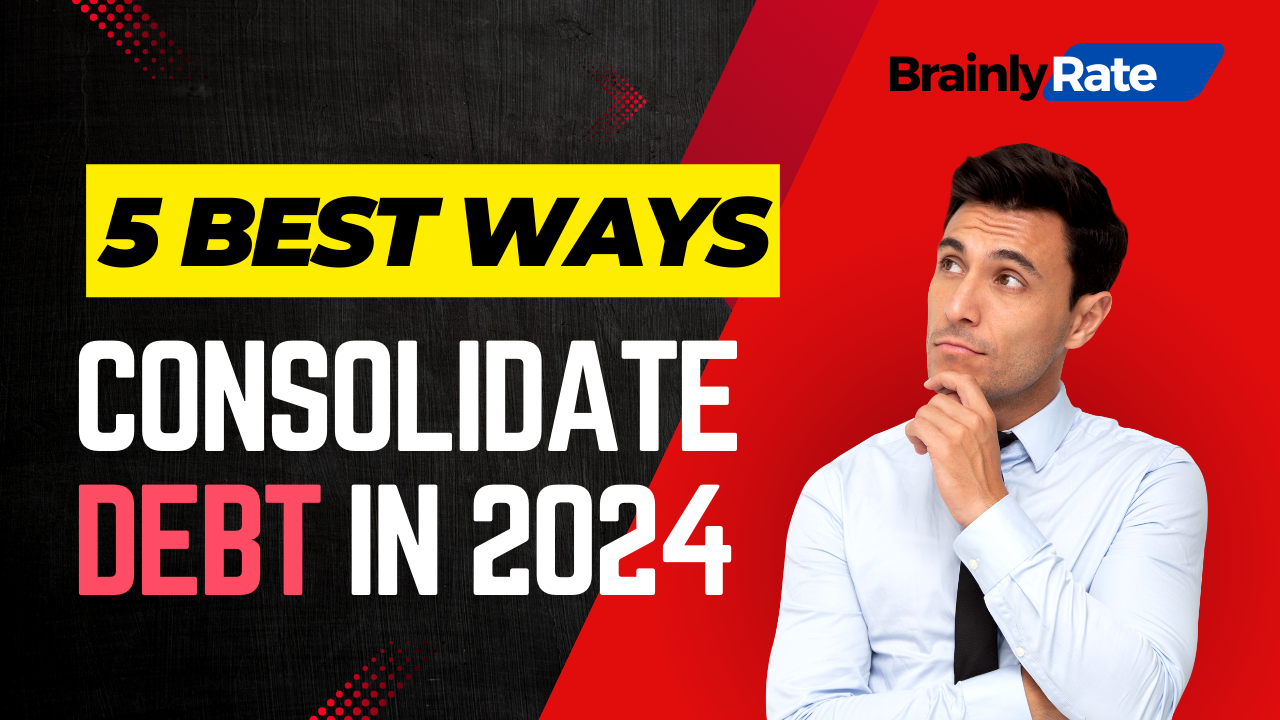In 2024, debt consolidation remains a pivotal strategy for individuals grappling with multiple debts. This financial maneuver involves combining various debts into a single, more manageable loan, often with a lower interest rate. The essence of debt consolidation lies in its ability to simplify the repayment process and potentially reduce the overall interest paid. In an era where financial stability is paramount, understanding and effectively managing debt through consolidation can be a crucial step towards achieving long-term financial freedom.
Types of Debt Consolidation Methods
Various methods are available for consolidating debt, each with its unique features and suitability depending on individual circumstances:
- Balance Transfer Credit Cards:
- These cards allow you to transfer existing credit card balances to a new card, usually with a low or 0% introductory APR.
- Ideal for those with high credit card debt and a good credit score.
- Personal Loans:
- Unsecured loans that can be used to pay off multiple debts, leaving you with one fixed monthly payment.
- Suitable for those with a stable income and a decent credit history.
- Home Equity Loans:
- These involve borrowing against the equity in your home to pay off debts.
- A viable option for homeowners, but it’s important to consider the risk of putting your home as collateral.
- Debt Management Programs:
- These programs, often offered by credit counseling agencies, involve working with a counselor to pay off your debt through a single payment plan.
- Beneficial for those needing professional guidance to manage their debts.
- 401(k) Loans:
- Involves borrowing against your retirement savings.
- While it can have lower interest rates, it’s crucial to consider the potential impact on retirement savings.
Evaluating Your Debt Situation
Before diving into debt consolidation, it’s crucial to thoroughly evaluate your financial situation. This involves:
- Assessing Your Total Debt: Compile all your debts, including credit card balances, personal loans, and other obligations. Understanding your total debt is the first step in crafting an effective consolidation strategy.
- Understanding Interest Rates and Terms: Analyze the interest rates and repayment terms of your current debts. This insight is vital in determining whether consolidation will be beneficial, potentially leading to interest rate reduction and more favorable terms.
- Importance of Credit Score: Your credit score plays a significant role in your consolidation options. A higher score may unlock lower interest rates and better loan terms, making it a critical factor in the consolidation process.
Pros and Cons of Different Consolidation Methods
Each debt consolidation method has its unique advantages and challenges:
- Balance Transfer Cards:
- Benefits: Can offer a low or 0% introductory APR, providing significant interest rate reduction.
- Limitations: The promotional rate is temporary, and future interest rates can be high if the balance isn’t paid off in time.
- Personal Loans:
- When They Make Sense: Ideal for consolidating multiple debts into one payment with a fixed interest rate. Suitable for those with a good credit score and stable income.
- Resources: For more information on personal loans, visit Consumer Financial Protection Bureau.
- Home Equity Loans:
- Risks: Involves using your home as collateral, which can be risky if you default on the loan.
- Rewards: Typically offers lower interest rates compared to unsecured loans.
- Debt Management Programs:
- How They Work: Involves working with a credit counselor to create a manageable payment plan. These programs often negotiate with creditors to lower interest rates and waive fees.
- Resources: Learn more about these programs at National Foundation for Credit Counseling.
- 401(k) Loans:
- Advantages: Lower interest rates and the interest paid goes back into your retirement account.
- Drawbacks: Risky as it involves borrowing against retirement savings and can have tax implications if not repaid on time.
How to Choose the Right Debt Consolidation Method
Choosing the right debt consolidation method requires careful consideration of several key factors:
- Factors to Consider:
- Interest Rates: Seek options with lower interest rates than your current debts to save on interest payments.
- Fees: Be aware of any origination, transaction, or prepayment fees associated with consolidation loans or credit cards.
- Loan Terms: Consider the length of the loan and how it aligns with your repayment capacity.
- Impact on Credit Score: Understand how each method affects your credit score. For instance, opening new credit accounts (like balance transfer cards) can temporarily lower your score.
- Long-Term Financial Goals: Align your choice with your long-term goals, such as improving credit score, becoming debt-free, or buying a home.
For more detailed guidance on how these factors impact your decision, the Consumer Financial Protection Bureau offers valuable resources.
Strategies to Avoid Falling Back into Debt
To maintain financial stability and avoid falling back into debt, consider the following strategies:
- Budgeting and Financial Planning:
- Develop a realistic budget that accounts for all your expenses and income.
- Regularly review and adjust your budget to stay on track.
- Avoiding Unnecessary Expenses:
- Cut back on non-essential spending.
- Practice mindful spending to ensure your purchases align with your financial goals.
- Building an Emergency Fund:
- Aim to save a portion of your income each month to build a fund that covers at least 3-6 months of living expenses.
- An emergency fund can prevent the need to rely on credit during unforeseen financial challenges.
FAQs
What is the most effective way to consolidate debt in 2024?
The most effective way to consolidate debt in 2024 depends on individual financial situations. Key considerations include:
- Total Debt Amount: Assess how much debt you have and what types it is (credit card, personal loan, etc.).
- Credit Score: A higher credit score can provide access to better consolidation options with lower interest rates.
- Financial Goals: Align your consolidation method with your long-term financial goals, whether it’s reducing monthly payments, paying off debt quicker, or improving your credit score.
How does debt consolidation affect credit scores?
Debt consolidation can have both positive and negative impacts on your credit score:
- Short-Term Impact: Initially, it might lower your score slightly due to the hard inquiry from applying for a new loan or credit card.
- Long-Term Impact: Consistently making on-time payments can improve your score. Additionally, reducing your credit utilization ratio by paying off revolving debt can also have a positive effect.
Are debt consolidation loans a good idea for everyone?
Debt consolidation loans are not a one-size-fits-all solution. They are more beneficial for individuals who:
- Have a good to excellent credit score, which can secure lower interest rates.
- Can manage a single monthly payment responsibly.
- Are looking to simplify multiple debts and potentially reduce the total interest paid.
However, for those with poor credit or unstable income, consolidation loans might not offer significant benefits and could lead to further financial strain.
What are the risks associated with debt consolidation?
Risks associated with debt consolidation include:
- Increased Debt: Without proper budgeting and spending habits, there’s a risk of accumulating more debt.
- Collateral Risk: Using secured loans (like home equity loans) puts assets at risk if you default on the loan.
- Longer Payment Terms: Some consolidation loans may have longer payment terms, which could mean paying more interest over time.
How long does it take to consolidate debt and see results?
The time it takes to consolidate debt and see results varies based on:
- Debt Amount: Larger debts will naturally take longer to pay off.
- Consolidation Method: Different methods have varying time frames. For example, balance transfer cards often have promotional periods, while personal loans have set terms.
- Personal Financial Management: Your commitment to making regular payments and not accruing additional debt plays a crucial role.




